Training methods
ABIS is offering its IT expertise by means of different training methods: instructor-led Classroom training, Individual training and coaching, Guided self-study, Blended learning, Mentored workshops ...
Each of these has its own characteristics and advantages, but also its own challenges. Together we can decide on the best fit for your specific situation!
Classroom training
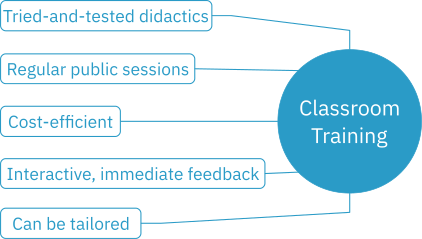
ABIS offers many of its courses as instructor-led, classroom training. Most of our classroom training is implemented as publicly scheduled training sessions, planned in Belgium, the Netherlands and in virtual classroom. Obviously we can set up an in-company session for you as well, which we can tailor to your specific needs (content, didactics, ...).
We are convinced that the classroom approach still offers a tremendous 'added value', as explained below.
- The course leader / instructor is a motivator and catalyst. Problems, questions, doubts and uncertainties are promptly discovered; practical experiences can be exchanged between instructor and participants; and if at all possible, the instructor can comment on company-specific situations and issues.
- The didactics and content of the courses are tried-and-tested: they focus on what's essential, maximizing their return.
- The instructor can and will stimulate the exchange of experiences between participants. And participants can, and will, stimulate each other!
- The instructor is your guide through the vast world of available learning resources (online, books, videos, ...), filters relevant content and can point the participants to the most suited ones.
- Theory is supported by practice: real-life cases are elaborated. We verify - and if so desired, test - both participant short-term memory, as well as understanding, insight, and overall comprehension of the subjects discussed!
- Classroom training is based on an extensive syllabus. This syllabus, developed by ABIS instructors, is used during the training. Its structure and content allow it to be used as a manual and reference later-on! This course material is based on best-practices - approaches, procedures, etc. developed and documented by ABIS staff. The resulting material? Applicable, relevant, without any unnecessary overhead.
- Our courses are also available in a virtual classroom: a live, interactive training session, that you can attend from the comfort of your own desk.
Individual training and coaching
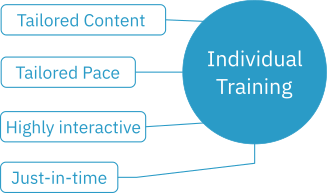
The most comfortable and arguably most efficient training method is a one-on-one training session with a dedicated instructor. It offers most of the advantages of classroom training and; on top of that, individual training can be perfectly made-to-measure for the trainee.
- While this training form is obviously not the cheapest available solution in terms of course price per training day, an individual training's content and pace is perfectly adapted to the trainee. Because of that, it can be a cost-effective solution for fast learners, or when only some specific topics of a training need to be discussed. In these cases, the training can be done in a shorter time-span, keeping the overall training investments in-check.
- An individual training session can typically be organised on very short notice.
- A brief individual training of a few days can be combined with a coaching track of several weeks/months, where the instructor remains available for further guidance while the trainee puts the newly-obtained knowledge into practice.
Guided self-study
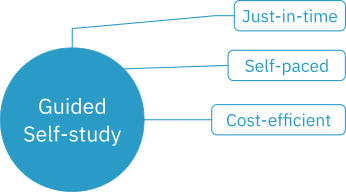
For some of our training topics, ABIS created a self-study-guide, to be used in combination with our standard course syllabus. A typical guided self-study-scenario is organised online, with remote access to our technical course setup. One of our instructors gives a technical introduction, and is available throughout the duration of the training for questions and feedback. Alternatively, the trainee comes to our premises for the duration of the training.
- An individual self-study session can typically be organised on very short notice.
- A guided self-study session typically has a similar sharp price to an enrolment for a public training.
- Thus, it is an ideal scenario when someone has to get up-to-speed quickly with a certain technology, even when public sessions of said technology are rare.
Blended learning
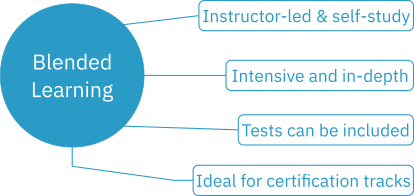
In a blended learning track, participants combine e-learning and self-study with classroom training sessions. For example, our blended learning training approach is used for certification tracks.
ABIS implements blended learning with a flipped classroom model. First, participants individually prepare and study specific technical topics; then, at regular intervals, classroom sessions are organised for them to be able to apply and build upon what they learned. In a typical classroom setup, the opposite model is used.
- In order to help participants prepare and study, a detailed study guide is available. This study guide contains details about both the organisation and planning of the training track and its individual training blocks.
- Each blended learning track is divided in a number of well-structured training blocks. For each block we define:
- The content to be studied by the participant. We clearly specify what needs to be prepared (essential and/or optional topics). Participants individually prepare each training block at their own pace, using the resources we provide. Our instructors are available to help them with specific questions and/or problems if needed.
- The different technical resources available to acquire that knowledge: for the e-learning and self-study component, we typically suggest e-learning modules available on the internet, in combination with specialized technical literature, and traditional ABIS course materials. We provide a lab environment / sandboxing environment and exercises to try out the new concepts.
- Classroom sessions are organized at the end of each training block, where we test participant progress. A representative test is used at the start of each session to that effect. That test is then used afterwards to structure the discussions during the actual class. We explain topics that didn't fully land, offer participants additional technical background and discuss the questions and comments received. Extensive labs are prepared and evaluated. On the final day of a certification track, we prepare participants for the actual certification exam.
Using this approach, we offer each participant the possibility to decide:
- when and where to acquire the required knowledge: at the office or elsewhere, during office hours or not;
- how to acquire that knowledge: participants can decide for themselves what sources to use.
Obviously, the participant does not control:
- the technical content to be studied. ABIS decides - possibly in concertation with the customer - what content needs to be discussed in a specific track, at what pace, and how to evaluate whether the content has been assimilated by the participant.
- the actual participant monitoring and evaluation process. Our instructors continuously evaluate participant progress; and check whether or not they apply themselves in preparing the classroom sessions as agreed upon. Tests scheduled at the start of classroom meetings allow us - and participants - to keep track of the actual progress made. Our instructors not only test and evaluate participants, they also motivate and encourage them!
Mentored workshops
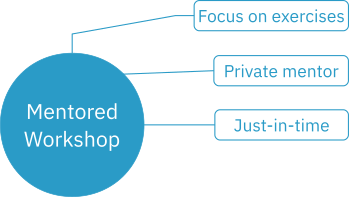
Mentored workshops offer participants the practical setting required to experiment with specific technologies for which they already have some basic theoretical background. Through a number of extensive labs, didactically presented and logically ordered, the participant will be introduced to some of the core aspects of the technology involved.
In this 'labs only' offering - it is assumed participants do already possess some relevant basic technical background (e.g. obtained by means of e-learning, PluralSight, SkillSoft ... ). As it is 'labs only', it is also individual in implementation; that is, participants can start the workshop at any time; and after a brief intake by one of our instructors, can go through the workshop at their own pace, in a private virtual environment. Note however a technical specialist is always available for help and guidance.
Labs are presented in a specific, logical fashion, thus allowing participants to get a better grip on the technology discussed.